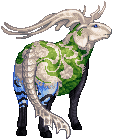Viewing F1-W-Swirl - Hamsa

Hardiness: 19
Appearance: 10
Emerged: 19:30 18.01.2024
Matured: 0:12 21.01.2024
The remarkably colorful wool of Stepa Safidos provides camouflage in their unusually vivid environs, a wide and grassy steppe nestled in the crook of a tall mountain range. Vibrant wildflowers and many-hued grasses offer bountiful food for these usually placid creatures. Female Stepa Safidos tend to form flocks of between seven and twelve ewes, while males are more solitary in nature and wander among flocks, especially during their mating season. Head-butting behavior has been observed between males when females are in heat and may last for hours, though horned individuals have a great advantage. Lambs stay close to their mother for the first few months after birth, then as they begin to wean, they start to form their own flocks. Although flocks often share similar characteristics in terms of wool color and patterns, the incredible genetic diversity of this species leads to noticeable differences when observing flocks found in different areas of the steppe. Wandering males help contribute to this variety, and new flocks may appear quite different from that of their dams.
The creatures that dwell in this rather desolate world still display some diversity in appearance, eating habits, and social behavior. Whether they have fur or feathers, skin or scales, their unique genetic makeup allows for a variety of colors and markings within each species. Despite limitations in food sources, herbivores, omnivores, and carnivores are all present in the food chain, and each species requires specialized care within a laboratory. Although the artificial setting of housing units and breeding pods precludes most opportunities to study true interspecific behavior, the interactions within and between species has been studied extensively in the wilderness by scientists daring enough to venture beyond the outpost’s walls.
